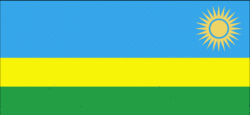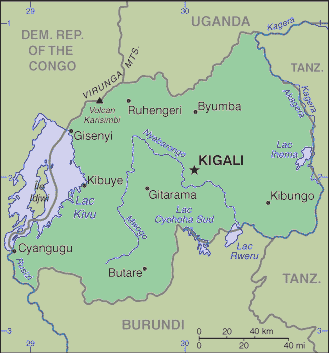Traveling Luck for Rwanda. Rwanda, Africa
Rwanda is located in Central Africa, east of Democratic Republic of the Congo.
Land in Rwanda is mostly grassy uplands and hills; relief is mountainous with altitude declining from west to east.
Rwandan land covers an area of 26338 square kilometers which is slightly smaller than Maryland
Rwanda has borders with Burundi for 290km, Congo (Kinshasa) for 217km, Tanzania for 217km and Uganda for 169km.
 Rwandan national flag (Flag of Rwanda)
Rwandan national flag (Flag of Rwanda)
As for the Rwandan climate; temperate; two rainy seasons (February to April, November to January); mild in mountains with frost and snow possible.
Rwandan(s) speak Kinyarwanda (official) universal Bantu vernacular, French (official), English (official), Kiswahili (Swahili) used in commercial centers.
Places of note in Rwanda
 Rwandan map
Rwandan map
Regions of Rwanda
In 1959, three years before independence from Belgium, the majority ethnic group, the Hutus, overthrew the ruling Tutsi king. Over the next several years, thousands of Tutsis were killed, and some 150,000 driven into exile in neighboring countries. The children of these exiles later formed a rebel group, the Rwandan Patriotic Front (RPF), and began a civil war in 1990. The war, along with several political and economic upheavals, exacerbated ethnic tensions, culminating in April 1994 in the genocide of roughly 800,000 Tutsis and moderate Hutus. The Tutsi rebels defeated the Hutu regime and ended the killing in July 1994, but approximately 2 million Hutu refugees - many fearing Tutsi retribution - fled to neighboring Burundi, Tanzania, Uganda, and the former Zaire. Since then, most of the refugees have returned to Rwanda, but about 10,000 remain in neighboring Democratic Republic of the Congo and have formed an extremist insurgency bent on retaking Rwanda, much as the RPF tried in 1990. Despite substantial international assistance and political reforms - including Rwanda's first local elections in March 1999 and its first post-genocide presidential and legislative elections in August and September 2003 - the country continues to struggle to boost investment and agricultural output, and ethnic reconciliation is complicated by the real and perceived Tutsi political dominance. Kigali's increasing centralization and intolerance of dissent, the nagging Hutu extremist insurgency across the border, and Rwandan involvement in two wars in recent years in the neighboring Democratic Republic of the Congo continue to hinder Rwanda's efforts to escape its bloody legacy.
Rwanda is a poor rural country with about 90% of the population engaged in (mainly subsistence) agriculture. It is the most densely populated country in Africa and is landlocked with few natural resources and minimal industry. Primary foreign exchange earners are coffee and tea. The 1994 genocide decimated Rwanda's fragile economic base, severely impoverished the population, particularly women, and eroded the country's ability to attract private and external investment. However, Rwanda has made substantial progress in stabilizing and rehabilitating its economy to pre-1994 levels, although poverty levels are higher now. GDP has rebounded and inflation has been curbed. Despite Rwanda's fertile ecosystem, food production often does not keep pace with population growth, requiring food imports. Rwanda continues to receive substantial aid money and obtained IMF-World Bank Heavily Indebted Poor Country (HIPC) initiative debt relief in 2005. Kigali's high defense expenditures have caused tension between the government and international donors and lending agencies. An energy shortage and instability in neighboring states may slow growth in 2006, while the lack of adequate transportation linkages to other countries continues to handicap export growth.
Rwandan natural resources include gold, cassiterite (tin ore), wolframite (tungsten ore), methane, hydropower, arable land
landlocked; most of the country is savanna grassland with the population predominantly rural
Rwandan religion is Roman Catholic 56.5%, Protestant 26%, Adventist 11.1%, Muslim 4.6%, indigenous beliefs 0.1%, none 1.7% (2001).
Natural hazards in Rwanda include periodic droughts; the volcanic Virunga mountains are in the northwest along the border with Democratic Republic of the Congo.
Travel Advice for Rwanda
RwandaSUMMARY
- We advise against all but essential travel to the rural border areas with Burundi and Democratic Republic of the Congo (DRC), except to the towns of Gisenyi, Kibuye and Cyangugu. This is because of the risk of cross-border incursions by armed guerrillas operating from both countries. Please see the Local Travel section of this travel advice for more details.
- You should be aware of the global risk of indiscriminate terrorist attacks, which could be against civilian targets, including places frequented by foreigners.
- The main type of incident for which British nationals require consular assistance in Rwanda is for medical emergencies.
- We strongly recommend that you obtain comprehensive travel and medical insurance before travelling. You should check any exclusions, and that your policy covers you for the activities you want to undertake. Please see: Travel Insurance
SAFETY AND SECURITY
LOCAL LAWS AND CUSTOMS
ENTRY REQUIREMENTS
HEALTH
GENERAL

 Search
Search Rwanda country profile
Rwanda country profile Travel advice for Rwanda
Travel advice for Rwanda